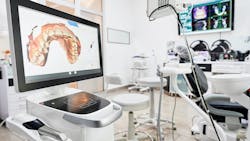Why high-performance cars and busy dental practices both need efficient reporting systems
My high-performance car tells me when its oil needs to be changed, if tires are low, and when the engine needs service. I don’t have the time or expertise to keep track of such complicated systems.
In the dental office, we are expected to remember what to do when our equipment fails, as well as every detail about each device, to schedule maintenance and routine testing, and track service people’s contacts and responses.
Delegating that responsibility to a team member takes a vital staff member out of treatment care. Busy solo or multiple-location offices could benefit from a system that simplifies and predicts dental equipment service, purchase, and compliance.
Busy solo or multiple-location offices could benefit from a system that simplifies and predicts dental equipment service, purchase, and compliance.
One such system, UptimeHealth, manages equipment efficiently, by first creating a comprehensive, searchable list of all of the devices owned by the practice organized by category, model, serial number, location in the building, in-office contact, date of purchase, and purchase price. The roster also indicates upkeep or maintenance needed for that equipment on a daily, weekly, monthly, quarterly, annual basis, and whether it’s compliance-related, such as testing of sterilization equipment.
A task management engine flags the tasks and stores the maintenance record in individual digital binders. When something is broken, a click sends a message to the appropriate technician, along with all of the pertinent information on that device, and an office contact. Staff members can monitor the service-call schedule, what parts are ordered, and when it’s complete.
Besides fixing the equipment, UptimeHealth’s software analyzes data about your equipment such as its failure rate and costs to support repairs. Depreciation reports suggest when it may make sense to replace equipment.
You may also be interested in: AI for 3D dental imaging: It'll soon be by your side
Facilities management is also time-consuming and often frustrating. So similar to opening a service ticket for a device, a service ticket can be opened on an area in the office, such as a plumbing issue. Uptime Health assigns the task to a local plumber or handyman, and tracks the status and progress of the task.
CEO and cofounder of UptimeHealth Jinesh Patel noticed that “in most offices, there is no equipment expert. Yet every dental procedure requires some kind of instrument. It makes sense to know what you have and keep it all in good working order, without overtaxing your clinical or office staff.” For the future, the company is exploring adding document storage, for leases, HR documents, and licenses or compliance paperwork that may need updating or renewal.
I appreciate when my car lets me know that one of my systems is about to fail, instead of leaving me stranded on the side of the road. Clinicians with busy or multilocation practices don’t have time to stand around searching for model numbers or who to call for help. An operatory that comes to a standstill because of preventable equipment failure translates to clinical and financial loss. You need as much “uptime” as possible to make the most of your solo or multi-location practice.
Editor's note: This article appeared in the December 2023 print edition of Dental Economics magazine. Dentists in North America are eligible for a complimentary print subscription. Sign up here.
Lou Shuman, DMD, CAGS, is the CEO of Cellerant Consulting Group, dentistry’s leading corporate incubator and accelerator. He is a venturer-in-residence at Harvard’s i-Lab, cofounder of LightForce Orthodontics, a member of the Dental Economics advisory board, and founder of the Cellerant Best of Class Technology Awards. He was selected in 2021 by Global Summits Institute as one of the World’s Top 100 Doctors. Dr Shuman is a consultant for many leading companies in the dental industry, including UptimeHealth.
About the Author

Lou Shuman, DMD, CAGS
Lou Shuman, DMD, CAGS, is the CEO of Cellerant Consulting Group, dentistry’s leading corporate incubator and accelerator. He is a venturer-in-residence at Harvard’s i-Lab, cofounder of LightForce Orthodontics, a member of the Dental Economics advisory board, and founder of the Cellerant Best of Class Technology Awards. He was selected in 2021 by Global Summits Institute as one of the World’s Top 100 Doctors.
Updated September 20, 2022
